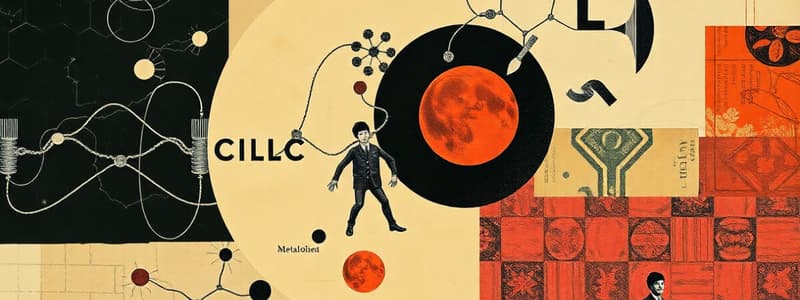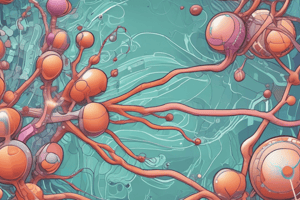Podcast
Questions and Answers
What is the substrate of the mitochondrial stage of gluconeogenesis?
What is the substrate of the mitochondrial stage of gluconeogenesis?
Which hormone is responsible for increasing blood glucose levels?
Which hormone is responsible for increasing blood glucose levels?
What enzyme deficiency leads to hypoglycemia in glycogenosis?
What enzyme deficiency leads to hypoglycemia in glycogenosis?
What is the normal level of glucose in human serum?
What is the normal level of glucose in human serum?
Signup and view all the answers
What role does glycogen mobilization play in the liver?
What role does glycogen mobilization play in the liver?
Signup and view all the answers
Which enzyme is crucial for maintaining blood sugar levels?
Which enzyme is crucial for maintaining blood sugar levels?
Signup and view all the answers
Which reaction is catalyzed by glycerol kinase?
Which reaction is catalyzed by glycerol kinase?
Signup and view all the answers
What is the primary enzyme responsible for glycogen mobilization in the liver?
What is the primary enzyme responsible for glycogen mobilization in the liver?
Signup and view all the answers
What is the final product of the breakdown of glycogen in muscles?
What is the final product of the breakdown of glycogen in muscles?
Signup and view all the answers
Which chemical bond is present in the linear regions of the glycogen molecule?
Which chemical bond is present in the linear regions of the glycogen molecule?
Signup and view all the answers
What is the donor of apoproteins in lipid metabolism?
What is the donor of apoproteins in lipid metabolism?
Signup and view all the answers
What process does insulin inhibit regarding fatty acids?
What process does insulin inhibit regarding fatty acids?
Signup and view all the answers
What is the product of the first reaction in fatty acid synthesis?
What is the product of the first reaction in fatty acid synthesis?
Signup and view all the answers
What regulates the synthesis of ketone bodies?
What regulates the synthesis of ketone bodies?
Signup and view all the answers
What is responsible for the removal of excess cholesterol from cells?
What is responsible for the removal of excess cholesterol from cells?
Signup and view all the answers
What is an inhibitor of HMG-CoA reductase?
What is an inhibitor of HMG-CoA reductase?
Signup and view all the answers
Study Notes
Glycolysis and Gluconeogenesis
- Glycerol kinase reaction: Catalyzes the reaction lyserodan-glycerol-3-phosphate.
- Gluconeogenesis substrate: Pyruvate/Krebs.
- Normal blood glucose levels: 3.5-5.5 mmol.
- Hyperglycemia: Blood glucose levels above normal.
- Hypoglycemia: Blood glucose levels below normal.
- Hormone increasing blood glucose: Adrenaline
- Hormone decreasing blood glucose: Insulin
- Organ most sensitive to hypoglycemia: Brain (during prolonged fasting).
- Gluconeogenesis mechanism: Synthesis of glucose from non-carbohydrate precursors.
- Glycogen storage disease: Congenital deficiency of glycogen phosphorylase leads to hypoglycemia.
- Liver enzyme for maintaining blood sugar: Glucose-6-phosphatase.
- Pentose phosphate pathway reaction: Riblose-5-phosphate formation by decarboxylation.
- Enzyme for ribulose to ribose conversion: Isomerase.
- Glycogen phosphorylase and synthase modification: Removal of phosphate groups.
- Muscle glycogen role: Doesn't maintain blood glucose levels due to lack of glucose-6-phosphatase.
Glycogen Metabolism
- Liver glycogen mobilization purpose: Maintenance of blood glucose levels.
- Liver-specific enzyme: Glucose-6-phosphatase.
- Hormone stimulating glycogen mobilization: Adrenaline.
- Enzyme activated by adrenaline: Glycogen phosphorylase.
- Product of glycogen breakdown in muscles: Glucose-6-phosphate.
- Glycogen structure: Alpha-1,4 linkages.
Lipid Metabolism
- Cholesterol removal: High-density lipoproteins (HDL).
- Cholesterol cellular transport reason: Maintaining cell membrane integrity.
- Insulin effect on beta-oxidation: Inhibition.
- Ketone bodies regulation: Hydroxymethylglutaryl-CoA-synthase (HMG-CoA-synthase).
- Fatty acid transport: Chylomicrons and VLDL.
- Genetic defect in lipid transport: Lipoprotein lipase (LPL).
- Stearic acid beta-oxidation ATP production: 147.
- Fatty acid synthesis first product: Malonyl-CoA.
- Fatty acid synthesis regulatory enzyme: Acetyl-CoA-carboxylase.
- Feedback regulation of cholesterol synthesis inhibitor: Lipid.
Amino Acid Metabolism
- Amino acid metabolism disruption: Tetrahydrobiopterin deficiency.
- Catecholamine synthesis rate control: Tyrosine-3-monooxygenase.
- Formyl group transfer: Serine-oxymethyltransferase.
- Transmethylation reaction amino acid: Methionine.
- Biogenic amine inactivation enzyme: Methyltransferase (DNMT).
Studying That Suits You
Use AI to generate personalized quizzes and flashcards to suit your learning preferences.
Related Documents
Description
Test your knowledge on glycolysis and gluconeogenesis, including key reactions, hormones, and the role of enzymes in glucose metabolism. This quiz covers important concepts such as normal blood glucose levels, the effects of hyperglycemia and hypoglycemia, and the biochemical pathways involved. Perfect for students of biochemistry and biology.



